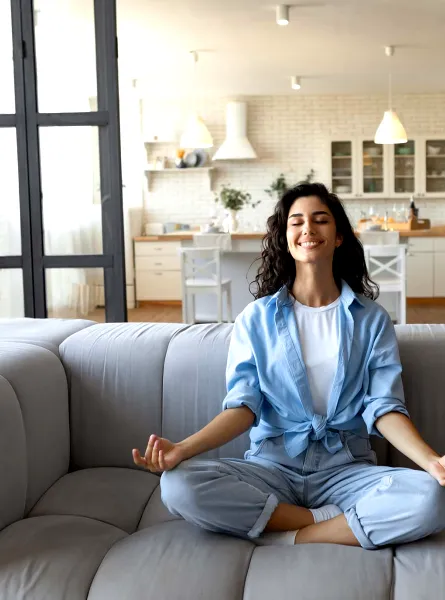
By Nathalie Lacombe, Wellness Coach and Speaker
To enjoy optimal energy and vitality for accomplishing everything we want throughout the day, it’s essential to get quality sleep at night.
The quantity and quality of our sleep affect all our bodily functions and systems; it’s the time when our body and brain “clean house” each night. During sleep, our brain and body undergo a series of repair and consolidation processes that impact every aspect of our functioning. Good sleep thus protects and rebuilds the resilience of our physical, mental, and immune health (1).
The following strategies are from the presentation, “Optimizing Sleep for More Energy and Success.”
The Importance of Creating a Bedtime Routine
Our circadian rhythm regulates almost all of our energy systems, including our sleep cycles, and it thrives on consistency. One reason a bedtime routine works is right in the name: routine. By repeating the same steps over and over, your circadian rhythm learns these are cues for falling asleep. The routine itself, even if short and simple, will naturally lead your brain and body toward sleep (2).
Trying to create something complicated and inaccessible can backfire by creating more stress at bedtime, keeping us awake even longer. It’s important to choose simple rituals that align with our lifestyle, family life, budget, and preferences.
Bedtime Rituals That Support Good Sleep Hygiene
We increase the likelihood of getting the quality and quantity of sleep we need when we reduce all forms of stimulation two to three hours before going to bed (3). Here are some examples to consider:
1. Auditory and Visual
Reducing stimulation for our eyes involves spending less time looking at screens of all kinds. Watching less television and spending less time on electronic devices as bedtime approaches supports an increase in natural melatonin, a sleep hormone (4). We can also dim or turn off lights in our home to signal our brain that it’s bedtime.
Blackout blinds or curtains can help keep our bedrooms as dark as possible, or a sleep mask may suffice. We should also reduce all noise before bedtime and use earplugs at night if needed.
2. Mental, Emotional, and Cognitive
We want to reach a calm state of mind before bed. This means avoiding tense conversations, media, and even entertainment right before sleep. Instead, choose activities and rituals that bring peace of mind. Reading printed materials, journaling, meditating, and practising gratitude are rituals shown to have positive effects on falling asleep and staying asleep (5-8).
3. Physical
Lowering body temperature supports falling asleep (9). Therefore, intense exercise should not occur within two to three hours before sleep, nor should we eat or try to digest a rich, fatty, or sugary meal (10).
4. Environmental
Creating a “sleep oasis” in our bedroom will train us to fall asleep more easily. This means a cool room kept below 20 degrees Celsius, no electronic screens (and no social media), and a space conducive to rest and intimacy.
Finding the Routine and Rituals That Work Best
The two key practices for a successful bedtime routine are consistency and customization; trying and adopting one step at a time will help us benefit from new positive routines.
It’s about discovering what helps us relax and prepares our mind and body for rest, whether it’s a soothing activity, a conducive environment, or a rhythm that respects our needs and lifestyle. By adopting simple, customized habits, we can transform our bedtime into a pleasant moment that allows us to fully recharge our energy for each new day.
Nathalie Lacombe delivers engaging presentations on topics like mental health, stress and anxiety, workplace motivation, work-life balance, and much more. Each presentation is carefully tailored to the specific needs of your company or organization.
Contact Nathalie to learn more!
References
- Irwin, M.R. (2015). Why sleep is important for health: a psychoneuroimmunology perspective. Annual review of psychology, 66, 143-72.
- Mindell, J. A., & Williamson, A. A. (2018). Benefits of a bedtime routine in young children: Sleep, development, and beyond. Sleep medicine reviews, 40, 93–108. https://doi.org/10.1016/j.smrv.2017.10.007
- Khazaie, H., Chehri, A., Sadeghi, K., Heydarpour, F., Soleimani, A., & Rezaei, Z. (2016). Sleep Hygiene Pattern and Behaviors and Related Factors among General Population in West Of Iran. Global journal of health science, 8(8), 53434. https://doi.org/10.5539/gjhs.v8n8p114
- Chang, A. M., Aeschbach, D., Duffy, J. F., & Czeisler, C. A. (2015). Evening use of light-emitting eReaders negatively affects sleep, circadian timing, and next-morning alertness. Proceedings of the National Academy of Sciences of the United States of America, 112(4), 1232–1237. https://doi.org/10.1073/pnas.1418490112
- Kaida, K., & Niki, K. (2014). Total sleep deprivation decreases flow experience and mood status. Neuropsychiatric disease and treatment, 10, 19–25. https://doi.org/10.2147/NDT.S53633
- Böhm, M. F., Bayen, U. J., & Pietrowsky, R. (2021). Nighttime sleep benefits the prospective component of prospective memory. Memory & cognition, 49(8), 1690–1704. https://doi.org/10.3758/s13421-021-01187-w
- Black, D. S., O'Reilly, G. A., Olmstead, R., Breen, E. C., & Irwin, M. R. (2015). Mindfulness meditation and improvement in sleep quality and daytime impairment among older adults with sleep disturbances: a randomized clinical trial. JAMA internal medicine, 175(4), 494–501. https://doi.org/10.1001/jamainternmed.2014.8081
- Sansone, R. A., & Sansone, L. A. (2010). Gratitude and well being: the benefits of appreciation. Psychiatry (Edgmont (Pa. : Township)), 7(11), 18–22.
- https://www.sciencedaily.com/releases/2022/05/220520132837.htm
- Souissi, M., Chtourou, H., Zrane, A., Cheikh, R. B., Dogui, M., Tabka, Z., & Souissi, N. (2011). Effect of time-of-day of aerobic maximal exercise on the sleep quality of trained subjects. Biological Rhythm Research, 43(3), 323–330. https://doi.org/10.1080/09291016.2011.589159





